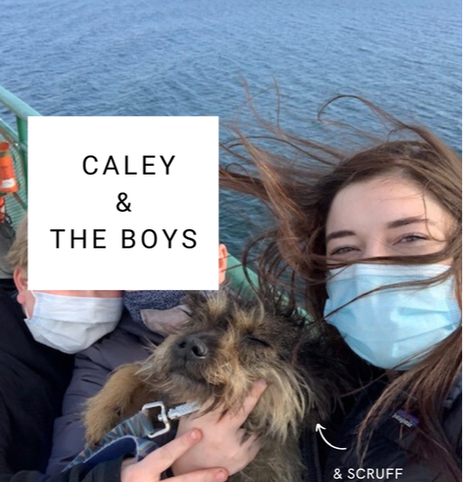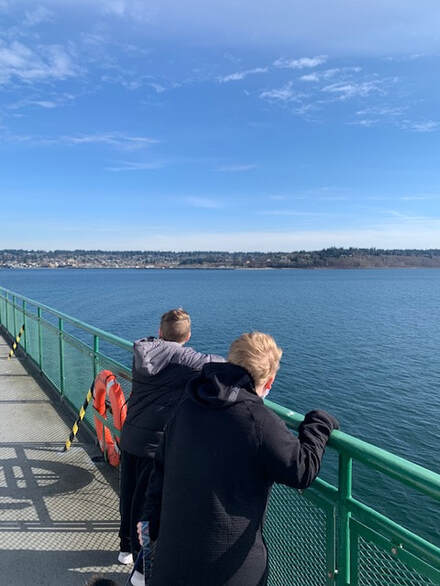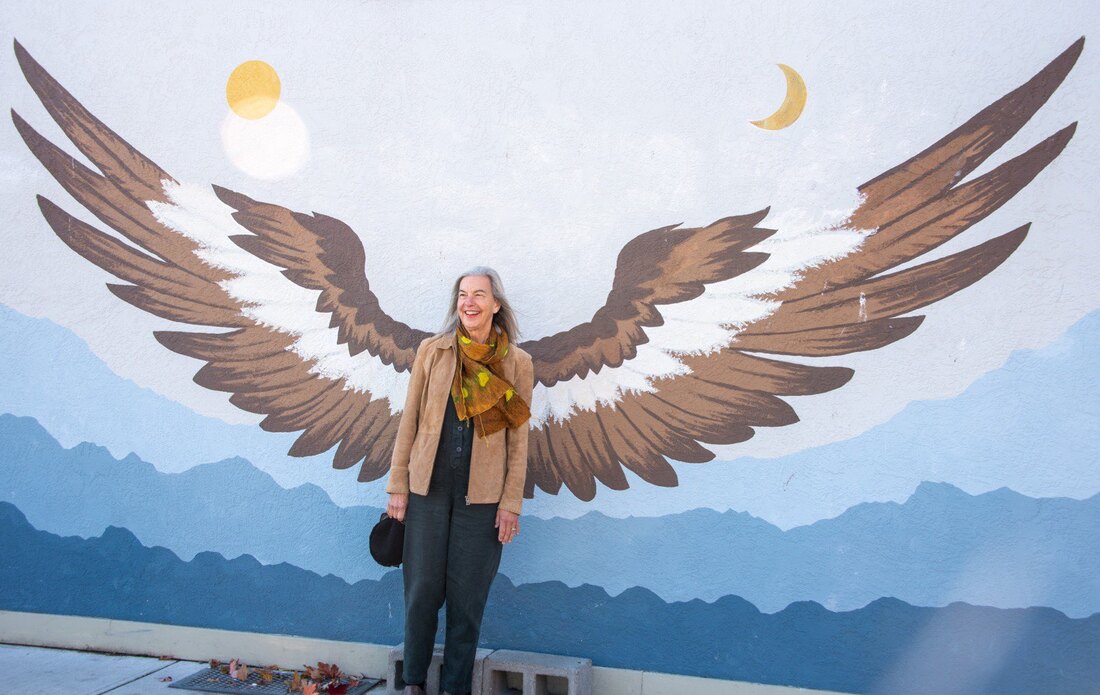 When Love Box volunteer, Caley, was matched with brothers Josh & Jacob,* she committed to journey alongside them, no matter where the foster system took them. Going into this role, here is what Caley didn't know:
Foster care is often full of unknowns and things beyond our control. What Caley could control, was her ability to be steadfast, patient, and honor everyone with her words and actions. As the boys packed their things, yet again, Caley wrote a letter for the DCYF social worker to give to the new foster parents. And then she held her breath... To Josh & Jacob's new Foster Family, Thank you for keeping these amazing brothers together and welcoming them into your home right before their birthdays and Christmas. I recognize the holiday season is hectic as it is, and your love and care for these boys are not going unnoticed. To introduce myself, my name is Caley, and I was fortunate enough to meet Josh & Jacob through Olympic Angels (a local organization supporting foster children and their foster families). I have undergone a background check and trauma-informed relationship training in order to best support the foster care community. I have gotten to know these boys over the past few months and love them dearly. I would love the opportunity to get to know your family and support you in whatever ways I can. I am here to help make your lives easier and help make this transition for your family and the boys as smooth as possible! I spent Sunday afternoon with the boys and they shared their birthday wishes and presents that they want. (Their birthdays are both coming up in about a week!). I have a couple of gifts that I’d like to give the boys around their birthdays. If you have a different birthday plan in mind, I’d be happy to offer my help! Here are some ways that I am able to offer support through Olympic Angels: provide birthday/Christmas gifts, babysit, take the boys to the park, drop off family dinners, provide gift cards when new clothes or school supplies are needed, and tutor the boys. I am here to support your entire family unit. I am so grateful to you for your heart and your willingness to keep Josh & Jacob together, loved, and cared for. Please reach out to me at anytime and let me know how I can best support your foster family and the boys moving forward. - Caley  I'm so happy to tell you that the foster family welcomed Caley and the Love Box. The foster mother included Caley fully on the team for the boys and kept her connected, despite the obstacles. This month Caley moved these boys home with some of their biological family for the first time in a long time. As life would have it, they are going to live on the other side of the water, close to where Caley has found a new job and home for Scruff & herself. She already has the bunk beds waiting. Caley is a Love Box leader. Behind her is the Love Box team. Behind each of her actions, each of her offerings of meals, gifts, and time, is a robust Love Box of 8 additional committed folks. She truly could not have done this without Quinn & her mom Christy, couples Leigh & Cliff, Shelli & Jason, Patty & dear Melissa. Caley begins her update emails with, "Hey Love Box Family!" This group was pieced together because of their common heart to serve children in the foster care system well. Most didn't know each other prior to saying "yes" to this adventure together. But they have cooked, babysat, tutored, driven to family visitations, celebrated and grieved together. This is what community does for its children. Interview with Caley, World Changer & Love Box Leader What do you wish people knew about foster care? How big the need is for them to be involved in some way. There is room for everyone to be a part of the village of support, to support the kids, the foster parents, and the biological families. What have you been able to do for the boys in your Love Box family? I am able to be a consistent adult that loves them and is there for them regardless of where they go. I think for them, as they’ve moved through three different homes, they always knew I was there and I was always going to be there. It gives them a person to trust who wants to be there, who isn’t paid to be there. I’m not a service. I’m an adult who loves them. How were you received by others? I think this is an important part of the story to share. Once their social worker at DCYF was able to understand that our purpose was to love these boys and stay present in their lives, it lightened the load for everyone. We were able to help with their visitation with their parent by transporting the boys to Seattle for visits every weekend. Their parent was able to see them in their own home. They didn’t have to come to a hotel to see them which was better for everyone. For the boys, this was a real visit with family. It was fun. We got snacks, ice cream, listened to music on the way. We had fun with it. What else? I want to be a foster parent one day. This has helped me see that I had a little more heart change and growth to do before I can fully foster successfully. By successfully, I mean I have the goal of keeping siblings together until permanency (reunification with family or adoption) is reached. I wouldn't want to have children moved from my home or separated because I wasn't ready to do the work on my end. This experience is helping to get me ready. What have you personally gotten out of the experience of volunteering as a Love Box Leader? I have grown so much in my understanding, empathy, and love towards all the parties involved. Everyone has a different story of how they got to where they are, and we all want the best for the boys. The perspectives are very different (various foster parents and biological family, social workers, and Love Box members), and I don't agree with some of them, but everyone is coming from a good place. I have learned that there are so many different ways to show love. *names changed to protect privacy
0 Comments
Volunteers Calah & Andrew introduced themselves to their Love Box family with a letter. It was during the pandemic, after all, and the Love Box had been matched and trained virtually. Andrew and Calah gave this couple what we share with you now: a cheat sheet to some Olympic Peninsula Family Adventures. This wisdom was hard won and collected among their friends, each sharing with the other what they had learned about how to have a good time, for a little bit of money while raising little people in a very wet and often chilly corner of the world.
The foster family that Calah & Andrew were matched with were very new. New to fostering. New to Port Townsend. New to parenting in general. Soon after being licensed, they were matched in the Love Box program, just as they brought two children into their home. Here's the letter Andrew & Calah crafted. We hope you find some inspiration for your adventures with the families you serve, your grandchildren, and any young people in your life! Welcome Let us introduce ourselves, we are Calah and Andrew, members of your Love Box team. We moved to PT when our son was 3 and our daughter was a baby. Our son is now 16 and our daughter 13. Our families of origin are in New England, so we had to figure things out and build our own support network in Port Townsend. We have put together a guide of places, activities, and other things that we have learned along the way. Hopefully a few of these things will be helpful for you. Prepared for Adventure One of the things we learned from a local nanny was to carry an adventure “Go Bag”. She always had a backpack with everything needed for adventure in Port Townsend. We tried to replicate it with our own. Here are a few things that we carried in it:
Adventure Ideas
Structured Activities and Support
"As I got older, I realized things I cared about from a social justice viewpoint were all related to foster care. When I learned about the Angels model it made me realize 'This is it!'"
Stephanie began as one of Olympic Angels' first volunteers. Once she was on a Love Box team and saw the impact that it made for the children and the entire family, it hit her how powerful Angels can be. "I always thought someday Angels would hire more case managers and when it happens I would love to do that part time while continuing my business. I just didn’t know it would happen so soon!" We are beyond grateful to be able to bring Stephanie onto our growing team, and be better able to serve the children on the Peninsula. In a conversation with Stephanie, we were able to get an inside look as to what her goals are in this new role. What are your top 4 skills and how do you think they will translate to this new role? Connecting. I love connecting people. Matching mentors and volunteers with kids and families will be so rewarding. Teaching. I am very at home when I am teaching so I would love to teach volunteers and community members about the program and trauma-informed practices. Organization. I love organizing tasks like bookkeeping. There are a lot of moving parts in this program to keep organized so I am excited to dive in. Vulnerability. I'm comfortable talking about sensitive topics openly and encouraging vulnerability. If you could snap your fingers, what problem in the world would you solve and why? Inequality. If we had an equitable playing field many of the other problems in the world would start to resolve themselves. What criteria do you use for evaluating success? My personal success is based on my quality of life & joy. Evaluating Olympic Angels' success would be based on reaching every kid in the local foster community and doing better every year. Elsa: OUr Interview with a Dare to Dream Mentor “I just get to be a consistent person who cares what happens to them.” Elsa has been matched with her Dare to Dream teen for about two months but they've been connected much longer through our partner organization, Foster Supports of Jefferson County. The two have been able to create a lifelong connection that is based on consistency and safety. Our Dare to Dream program offers an opportunity to individually serve an aged-out or at-risk to age out youth in foster care. Our mentors are advocates, teachers, guides, role models, valued friends, and available resources. We had the opportunity to share some time with Elsa and ask a few questions about her experience as a mentor and how she has been impacted. Here is what Elsa had to say: WHY DID YOU DECIDE TO BECOME A DARE TO DREAM MENTOR? I liked the idea of being a friend to a teen that is getting their life ready to launch. For them there has not been much consistency with a person who has belief in them. I am honored that they said yes to this relationship. WHAT TYPE OF SUPPORT DO YOU PROVIDE YOUR YOUTH? In regular meetups, I am telling them by my actions that I follow through and think they are fun to be with. We talk about what they want to discuss and I make sure I focus on them. We have looked into how to apply for a job and met the personnel man at Carl’s Lumber. We have talked a lot about school, helped them get registered and what school means to them. I attended their IEP, met his family, and I fed them what they wanted! HOW DOES BEING A MENTOR IMPACT YOUR YOUTH AND YOURSELF? They seem to be happy when I come see them and they teach me about Magic, the Gathering. They were quite happy to see their former speech teacher who is a friend of mine. Being a mentor helps define our relationship, I don’t have to fix them or the system they are in…I just get to be a consistent person who cares what happens to them. WHAT’S MOST DIFFICULT OR FRUSTRATING ABOUT BEING A MENTOR? Trying to reach them. They do not have minutes on their phone and they do not answer emails. We do have a consistent meeting time at home where we both are each time. WHAT’S MOST REWARDING ABOUT BEING A MENTOR? Their smile and willingness to be involved with an adult who cares. WHAT WOULD YOU LIKE PEOPLE TO KNOW ABOUT FOSTER CARE? No matter what the situation is it is very tough to not have a family that you can count on to see you through life. At 16, they have a roof over their head and love from a family member but are missing so many pieces. They have had many extremely rough times that have left scars. IS THERE ANYTHING ELSE YOU’D LIKE US TO KNOW? Foster care can provide what a person needs to grow and develop especially when the community surrounds you by guiding you through these various stages of life. Each person in our larger community can contribute something to a foster child that completes the picture. It is not hard to love a child or teen and give yourself to see another blossom. Olympic Angels is founded on the vision that every young person in foster care deserves healthy, affirming, and lasting relationships with trusted adults. Our belief is that if the harm came to children in relationships than that is where the healing will happen as well. We all can do something to improve foster care for children. Most of the work to be done is relationship work. Work that is done by committed adults showing up again and again and again to remind children that their lives matter. This is slow work and the most important kind. We are watching in amazement as healthy relationships with committed volunteers change the actual experience of the foster care system for our children. In our small corner of the world, the Olympic Peninsula of Washington State, it turns out that community involvement was what was missing from the foster care system. Our goal for 2021 is to see TWICE the number of children matched with their someone this year. Our annual campaign is called Who's Your Someone to keep relationships at the center of all we do. We know that for every dollar raised, we get closer to matching more children with their Someone in the coming year. In this spirit, we asked for the Olympic Angels community to reflect back on who was someone who showed up in their own personal journey to adulthood. We asked you to tell us what they did for you. How they changed your path. We got back a soulful response from so many of you. We wanted to share some of your stories here: . When I was 19 I hit a fork in my path. It was impossible to imagine what could be ahead and I had no shortage of strong women in my life, but none of them had taken a path that I could picture myself on. Until I met Olga Ganoudis Designs, the first jeweler I worked for. She had her own business as an artist. She was fun, outspoken and passionate. Olga is an incredibly motivated and motivating woman. I say how much work she put into running her business and rather than scaring me away from that path, it lit a fire under me. In the years that I worked for Olga I learned about making jewelry and running a business. But more importantly, she was the person who opened up my imagination to potential futures fo myself that I hadn't been able to see before. She was the person who made those possiblities, and the steps to get there, seemed doable. For teens aging out of foster care, the obstacles are vase and plenty. Rarely do they have that person to help them imagine their future or navigate the steps forward. - Stephane Selle My mom met Justine when I was only 1 years old in a mother's group and they quickly became best friends. My mom was a single mother and we had no extended family that lived near us. So Justine would babysit me. Her kids quickly became my best friends. I spent countless hours at her house even when she wasn't on babysitting duty. Justine lived in a better school district and for a few years we used her address as my home address so I could attend a better elementary and junior high school. Lots of times I would go there after school on Friday and stay until Sunday evening. Her home became my second home. When I was 10 my dad got a different job and had to move from Florida to Tennessee. I can remember being at Justine's shortly after he told me he was moving and crying in her arms. Justine's house was the best place to be. Full of good snacks, fun and tons of kids. All of her kids' friends were always there and she let them use it as a safe haven when their own family lives were complicated. When I was 16 I was dealing with heartbreak, other teenage emotions and drama with my own mom. I felt so low and so bad about myself I contemplated doing dangerous/bad things. I drove to Justine's and told her all of this and how I wanted to live with her. Her and my mom had a long talk and I got to "live" with her for a week as she talked sense into me and helped me deal with everything. Justine and her kids were my "village". Her daughters were the sisters I never had. I am so blessed that I had Justine to lean on and love me as her own. - Joy Johnson Growing up with two much older siblings and a widowed, hard working mother, I was a latchkey kid! Thankfully I found a second family in our neighbors, the Woodgates. The three daughters, stay-at-home mother, and Nana welcomed me almost every school day when I came home with Virginia, the middle girl. They always included me, and we had many great times. We even made a laughing record on their old phonograph. When Tim and I married Mr. Woodgate, Vernon, flew to Chicago and walked me down the aisle. The Woodgate family changed my life. - Jan White When I was little, Beau used to pick me up and carry me. He would lay me down on a hay bale and then pick me up again because it made me laugh. He did this so many times that he made it so he couldn't even pick up a cup of water - his arms were so sore. When my dog and cat died he came over to be with me. One time my mom and I came back from a yard sale and we got a Belgian waffle maker, and Beau & I were picking raspberries to eat on the waffles. Then bald faced hornets attacked and Beau saved me and got two stings on his biceps and I didn't get one blemish. When I was starting kindergarten, I had a hard time leaving my mom. So Beau would drive me to school and my mom would give me a lollypop so I had my lollypop for something to suck on while Beau would drive and he would place the same song every morning - it's sort of our song - Don't Stop Believing. Every year on the first Saturday of November it's Beau & K day. The first Beau & K day, we made crowns out of construction paper. We wore our Beau & K crowns all day. This year when we went to Beau and K day it was usual Beau and K day except for one thing - we had the BEST PIZZA at this restaurant in Bremerton. This year we wore sashes. One year we wore badges. Every Wednesday Beau picks me up from school and we hang out from 12-3. And once a month I get to pick a place to go out for lunch. He's my godfather and that's how it became Mama-Dada-Beau instead of just Mama-Dad. - Kenenisa Hanna It's not too late to share your story to raise awareness of Olympic Angels Annual Campaign. Visit www.olympicangels.org/someone to learn more.
|
AuthorWrite something about yourself. No need to be fancy, just an overview. Archives
April 2024
Categories |
STAY IN TOUCH
|
Contact Us |
Get Social |
